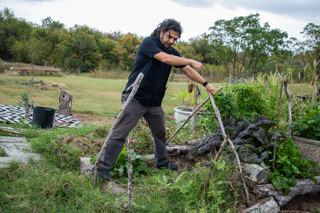
By Karen Gavis/managing editor
Sitting inside Starbucks speaking eloquently about visiting local art museums, one would never guess the TCC student has worked in the fields, wrestled bulls and outfoxed warthogs.
A former resident of Yakima, Wash., and later West Fargo, N.D., Florisa Esquivel now attends South Campus with plans to become a student activities director. Part of Esquivel’s family lives in Mexico, where she has often visited.
“We were migrant farm workers,” she said. “We worked in sugar beet fields, but when they produced ethanol, they started planting corn.”
Esquivel said she worked in the fields from age 12 until she was 17. Her family would rise before dawn for work, and she attended night school, which would sometimes last until 11 p.m.
“We would cut weeds, hoe weeds in the sugar beet fields,” she said. “The weeds, they were taller than me sometimes.”
Esquivel said the hard work was good because it allowed her to earn enough money to pay for part of her quinceanera, and she would return thinner and tanned.
In addition to big weeding, Esquivel has also ridden bulls.
When in Mexico, Esquivel’s family would sometimes drive an hour and a half to attend a bullfight because there wasn’t much to do, and it was a social event, she said. Her father earned money as a bullfighter and also created custom saddles and chaps. For protection, he wore a thick vest.
“My mom wouldn’t go [to the bullfights],” she said.
SE Spanish lab assistant Maritza Hernandez, who is originally from Mexico, said bullfighting is part of her culture. Her parents took her to bullfights when she was a child because it was a big fiesta. However, the sport does not appeal to her.
“It is dangerous,” she said. “Sometimes, the bull gets outside [the arena] and runs, and people get hurt.”
Hernandez also said if a rider is injured, the bull is sometimes killed.
“When they [the bulls] are really mad, they jump,” she said. “They want to get out of there.”
For some, bullfighting is symbolic of defeating the bull half of Minotaur, a half-man, half-beast creature in Greek mythology.
Esquivel hung out with her male cousins, who were bullfighters, and she wanted to try it also, she said. Her cousins yielded to her request, and after she had settled atop a bull, they threw a rock at its tail. The bull began bucking and promptly threw her on her first attempt.
“It was real fun,” she said. “It was like the thrill.”
Role expectations were different in Mexico, and Esquivel said she often experienced culture clash.
“The part of Mexico we were from, girls were not supposed to do that stuff,” she said. “I’m Americanized.”
SE Spanish instructor Diane Thornburg was born and raised in Mexico and has lived in small towns as well as Mexico City.
“The small towns have a more traditional view of the woman, but the large cities are very progressive,” she said.
Thornburg pointed out that the National Action Party’s nominee for president of Mexico was a woman: Josefina Vasquez Mota. However, in the home, domestic duties remain largely the woman’s responsibility.
“Men still like to be served their food and expect women to cook all the meals and keep the house clean,” she said. “But this is changing rapidly.”
Thornburg said the way women are treated depends upon locale and education level and is no different in the U.S.
In Mexico, Esquivel said her female cousins’ duties for the day were to wash clothes, clean, cook and watch children. But to her, that did not seem like much fun.
However, fishing for crawfish was, and that was something she enjoyed while on her grandfather’s ranch in Nuevo Leon. The ranch had no running water or electricity. Water was hauled from a vat, and bedding was shaken out to make sure no scorpions were lurking.
“It was fun, but at the same time you have to be wary because there’s a lot of warthogs out there,” she said. “They’re pretty dangerous.”
Esquivel said she and her cousins devised a plan to walk near fences so if a warthog chased them, they could jump over the fence.
“My grandfather used to tell us they’d cut your guts open,” she said. “You could hear them all night. It was like a horror movie.”
Esquivel said there were many cows in Mexico, and chickens would roam freely before returning to their owners in the evening. Esquivel enjoyed herding goats and helped slaughter them, she said.
“My sisters were like ‘ewww.’ It never bothered me,” she said. “My sisters, they just couldn’t do it.”
Esquivel said life in Mexico is relaxed and simple, and relationships there are much different than in America.
“It is much more formal,” she said. “It is not as carefree as over here, but you have your exceptions to the rules.”
Esquivel said several young men in Mexico had shown an interest in her.
“But I was always considered too headstrong or unapproachable,” she said.





















